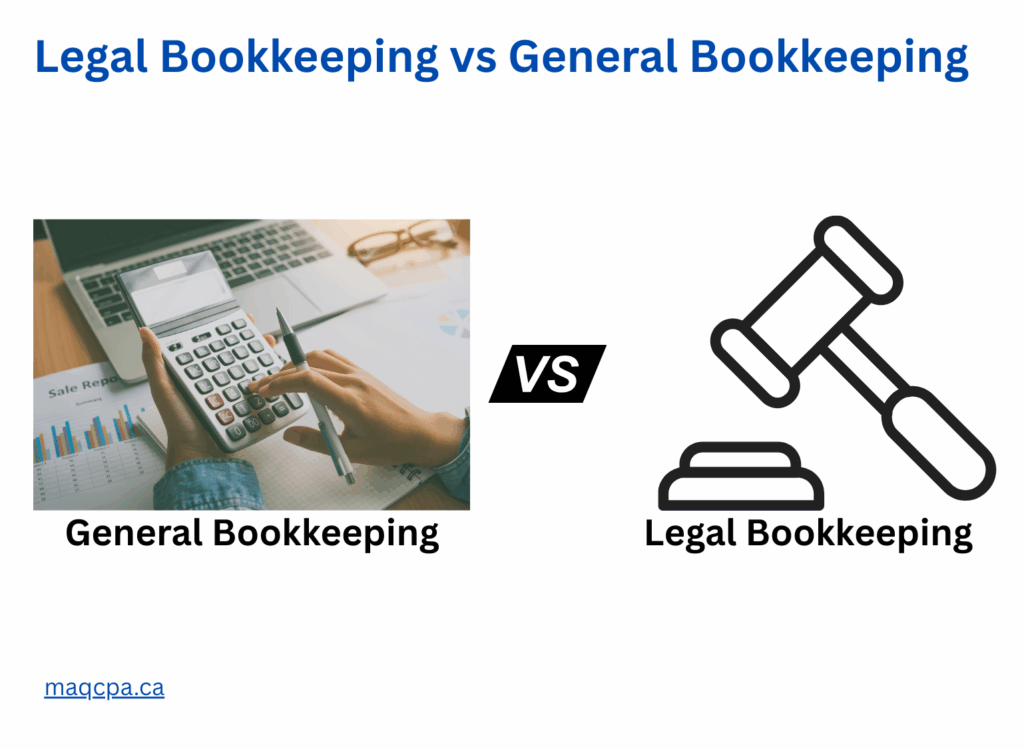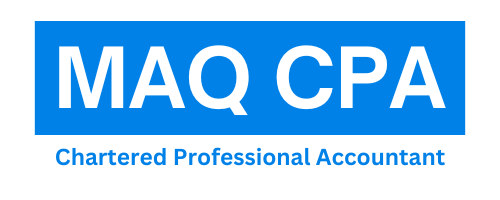If you’re a solo lawyer or small law firm in Toronto, your bookkeeper might be unknowingly putting your licence at risk unless you know the difference between legal bookkeeping vs general bookkeeping.
Many law firms assume that any good bookkeeper can manage their finances. But legal bookkeeping is not the same as general bookkeeping — and using the wrong person can lead to LSO compliance issues, CRA audits, or even disciplinary actions.
In this article, we break down the core differences between general and legal bookkeeping, and why hiring a legal bookkeeper in Toronto is one of the most important business decisions your law practice can make.

✅ Key Takeaways
- Legal bookkeeping includes trust account management, client ledger tracking, and compliance with LSO By-Law 9.
- General bookkeeping often lacks the skills or tools to manage trust accounting, reconciliations, and legal-specific rules.
- CRA and LSO audits are often triggered by bookkeeping errors — even unintentional ones.
- Working with a legal bookkeeper in Toronto ensures your firm remains compliant, audit-ready, and can scale confidently.
📘 What Is Legal Bookkeeping?
Legal bookkeeping is a specialized form of accounting and financial recordkeeping that ensures law firms comply with both the Law Society of Ontario (LSO) and the Canada Revenue Agency (CRA).
Legal bookkeeping responsibilities include:
- Maintaining separate trust and general accounts
- Tracking retainers and disbursements by client matter
- Reconciliation of trust accounts every month as required by By-Law 9
- Ensuring proper HST/GST handling on legal fees and expenses
- Preparing audit-ready reports for random LSO spot audits or CRA reviews
It’s both compliance-driven and industry-specific, with zero tolerance for error when it comes to client money.
🔍 How It Differs from General Bookkeeping
Here’s a breakdown of the key differences between legal and general bookkeeping:
| Category | Legal Bookkeeping | General Bookkeeping |
| Trust Account Rules | Must follow LSO By-Law 9 | Not required |
| Client Funds | Tracked per matter | Not applicable |
| Compliance Standards | LSO & CRA | CRA only |
| Reconciliations | Monthly (trust + general) | Often quarterly or annual |
| Reporting | Includes ledgers, reconciliation summaries, matter-specific records | Primarily P&L, balance sheet |
| Audit Risk | High with errors | Moderate |
| Software Used | CosmoLex, PCLaw, Clio | QuickBooks, Xero, Wave Accounting |
A general bookkeeper may be excellent in other industries but still completely unqualified to manage the complex needs of a law firm.
⚖️ Why Legal Bookkeeping Matters for Ontario Law Firms
The Law Society of Ontario is very clear: all licensed legal professionals must keep complete, accurate, and auditable records. Under By-Law 9, law firms must:
- Reconcile trust accounts every month
- Maintain detailed client trust ledgers
- Retain records for at least six years
- Keep supporting documents for all transactions
- Produce reconciliation summaries with every comparison
Failure to meet these standards is one of the top reasons lawyers face LSO investigations or suspensions — and many of those errors begin with well-meaning, underqualified bookkeepers.
📘 Source: LSO Trust Reconciliation Requirements
⚠️ Compliance Risks of Using a General Bookkeeper
Using a generalist bookkeeper exposes your law firm to risks like:
🚩 Missed Trust Reconciliations
General bookkeepers may reconcile accounts quarterly or annually — violating By-Law 9’s monthly reconciliation requirement.
🚩 Client Fund Co-Mingling
If your bookkeeper doesn’t understand legal trust rules, they might inadvertently mix trust and general funds — a serious breach.
🚩 Incorrect HST Reporting
Legal disbursements and fees are taxed differently. Misreporting GST/HST can trigger a CRA audit and penalties.
🚩 Incomplete Ledgers
Failing to maintain matter-specific client ledgers is a red flag for the LSO.
⭐ Top Benefits of Working with a Legal Bookkeeper in Toronto
✅ Full LSO Compliance
Legal bookkeepers know how to structure your records and reconciliations to pass spot audits with confidence.
✅ Trust Account Accuracy
Proper tracking of client funds ensures you’re never in violation of trust account rules.
✅ Efficient CRA Filing
Legal-focused bookkeepers understand how to file GST/HST, payroll, and other taxes specific to legal practices.
✅ Audit Readiness
If the CRA or LSO comes calling, your records will be organized, accessible, and aligned with every requirement.
✅ Scalability
With professional financial systems in place, you can hire, grow, or incorporate your law firm without administrative chaos.
✅ Checklist: Does Your Bookkeeper Know Legal Accounting?
Ask yourself (or your bookkeeper) these questions:
- Do you reconcile trust accounts monthly, not just general accounts?
- Are client trust funds tracked on individual ledger?
- Do you understand and follow By-Law 9?
- Are you familiar with legal-specific software (e.g., CosmoLex, PCLaw, Clio)?
- Can you prepare the firm for an LSO spot audit?
- Do you keep supporting documents for all receipts and disbursements?
- Are GST/HST on fees and disbursements handled correctly?
If the answer is “no” or “I’m not sure” to any of these, your law firm could be exposed to risk.
FAQ – Legal Bookkeeping Toronto / Scarborough
Is legal bookkeeping really that different from regular bookkeeping?
Yes. Legal bookkeeping includes compliance with LSO regulations, trust accounting, and client ledger maintenance — all of which don’t exist in standard bookkeeping.
Can I do my own legal bookkeeping with QuickBooks?
You can, but QuickBooks alone is not designed for legal trust compliance. It may work for general financials, but won’t satisfy LSO rules unless heavily customized.
What happens if I don’t reconcile my trust account every month?
It’s a violation of By-Law 9, and may result in a compliance audit, warning letter, or more serious disciplinary action from the LSO.
Do all Toronto CPA firms offer legal bookkeeping?
No. Many generalist CPAs and bookkeepers do not have the systems or experience to meet LSO and legal-specific needs. Ask if they serve law firms regularly.
How can I switch to a legal bookkeeper?
Start by booking a consultation. A legal bookkeeping CPA will review your current setup, correct any compliance gaps, and set up ongoing monthly support.
Final Words
Legal bookkeeping is not just another admin task — it’s core to your compliance, reputation, and ability to practice law in Ontario. Using a general bookkeeper can put your firm at risk of LSO scrutiny or CRA audit.
If you’re a lawyer in Toronto, Scarborough, Markham, or anywhere in Ontario, don’t take chances.
📞 Contact our Toronto-based CPA firm today to get a legal bookkeeping consultation — and finally get peace of mind.
👉 Book a Discovery Call Now
Read about our Legal Bookkeeping for Law Firms and Lawyers
Disclaimer
The information provided in this blog is for general informational purposes only and does not constitute professional accounting, tax, financial, or legal advice. While we strive to ensure the accuracy and timeliness of the content, the information may not apply to your specific situation or reflect the most current legislative changes. Readers are strongly advised to consult a qualified professional before making any decisions based on the content of this blog. MAQ CPA and its representatives disclaim any liability for any loss or damage incurred as a result of reliance on any information provided herein.
